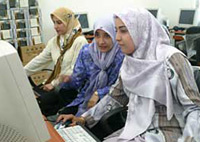The Role of Women in Stabilization and Reconstruction
Policymakers and practitioners increasingly acknowledge the critical role that women can play to build a stable peace in warring and post-conflict states. In recent months, the U.S. Institute of Peace, Women in International Security, the Joan B. Kroc Institute for Peace & Justice, and the Initiative for Inclusive Security have engaged a variety of stakeholders to explore specific, actionable recommendations to promote women in various stages of the peace process.
The Role of Women in Stabilization and Reconstruction is a USIP Special Report based on a series of working group meetings in 2005 and 2006. This publication presents a comprehensive list of recommendations to the U.S. government and highlights several critical action areas with the potential to significantly impact the protection and participation of women in post-war situations.

Iraqi women practice their computer skills at the Fatima Al-Zahra Center for Women's Rights in Hilla (just south of Baghdad). (Courtesy USAID)
United Nations Reform: Improving Peace Operations by Advancing the Role of Women describes the situation of women at all levels of staffing in UN peace operations, offering practical recommendations to address the organization's gaps in women's numbers and position. Published by Women in International Security (WIIS) and the Stanley Foundation, this report is based on expert consultations held in November 2006.
Who's Making Policy? What Difference Does It Make? An International Conference on Gender-Inclusive Decision Making for Peace with Justice is the outcome document from the 2006 Women PeaceMakers conference convened by the Joan B. Kroc Institute for Peace & Justice at the University of San Diego and the United Nations Development Fund for Women (UNIFEM). Over 150 experts shared strategies, models, and best practices of effectiveness for integrating women and gender issues into security policy and practice, governance and political leadership, and other areas.
Speakers
- Ambassador Harriet C. Babbitt
Co-Chair, USIP Working Group on the Role of Women; former Director, The Initiative for Inclusive Security - Ms. Camille P. Conaway
Independent Consultant; Women, peace, and security - Dr. Harriet Hentges
Co-Chair, USIP Working Group on the Role of Women; former USIP Executive Vice President - Dr. Joyce Neu
Senior Fellow, USIP; Executive Director, Joan B. Kroc Institute for Peace & Justice - Dr. Chantal de Jonge Oudraat
Vice President, Women in International Security - Beth Cole, Moderator
Senior Program Officer, U.S. Institute of Peace
Archived Audio
To listen to audio or to view video, please click on the links provided below. You also can right click on the links and choose "Save Target As" or "Download Linked File." This will save the file to your computer and then allow you to play it in your media player directly. More Audio Help.
- Listen to the audio from this event.
1:24:14 - 15.4MB



